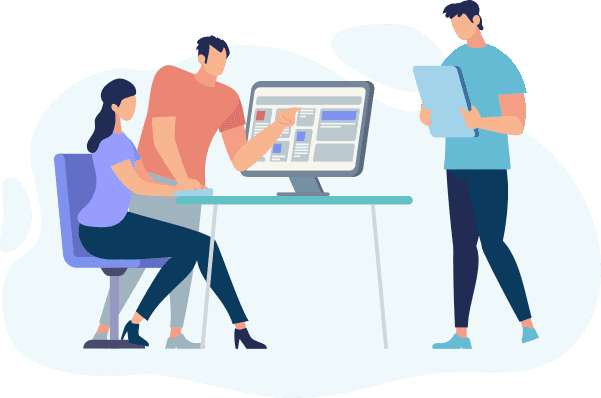Does a faster website bring more conversions?
Every business owner wants to bring in more leads, customers and generate lots of conversions. That’s great, but it also comes with some pressure. Lead generation and bringing conversions can be difficult, expensive, and also time-consuming. However, in recent years, many have connected the idea of having a faster website with bringing in more conversions and paid customers. Which does make you wonder, can you generate more sales if you have a fast website? Let’s find out!
Some facts to consider
- Around 40% of website visitors will go to another website if yours takes more than 3 seconds to load.
- 52% of online shopping enthusiasts state that their brand loyalty depends on how fast the website is.
- 14% of customers will start shopping from your competitors if your website is slow.
- 64% of those unhappy with your website will not come back, and they will go to another website to shop next time.
The first 5 seconds are crucial when it comes to conversions
If your website is not loading fast, then you automatically start losing conversions. A study from Portent shows that the first 5 seconds of website loading time are crucial. Ideally, you want your website to load within 2 seconds or less. This provides the optimal user experience and the best conversion rates. The slower your website is, the fewer conversions you will have.
Based on the Portent study, if you have a website that loads within a second, you get around 31.79% as a conversion rate. Anything around a second has a 20.22% conversion rate, then 2 seconds will bring 13.93%, with 3 offering 13.74%. Once you start going over 4 seconds, the conversion rate will be 12% or less. If you’re looking to improve transaction conversions, you want to have up to 2 seconds as a loading time. Anything over that will affect the user experience and your bottom line. It’s normal for the website conversion rates to drop with around 4.42% on average for each extra second of loading time. So the faster your website, the better.
Website speed is essential for consumers
Unbounce has a great study showing that around 70% of consumers are affected by page speed. They might not be willing to buy from an online retailer that’s very slow and doesn’t have breakneck speeds. It’s imperative to keep in mind that you need to optimize the website speed to achieve excellent conversion rates. If not, customers will go to your competitors for a better user experience.
It would be best if you thought about this from a user perspective. Would you trust to buy from a website that barely loads? Would you share your payment information or anything similar to that with a slow website? Let’s face it, slow websites don’t inspire any trust, and that becomes a problem. The best thing that you can do is to improve your website speed, and people will trust you a lot more.
Does this affect the e-commerce world?
Every website is affected by its loading speed. That’s especially true for e-commerce websites, where customers are actively buying products or services.
Will you have higher bounce rates if your website is slower?
Absolutely, and there’s a reason for that. Google themselves stated that the probability of having a higher bounce rate increases by around 32% if the load time goes from 1 to 3 seconds. What that means is that anything over 1 second of loading time can affect your bounce rates. In this case, just 2 seconds more can bring in a 1/3 increase in bounce rates. That’s very problematic for your website since the main focus is to capture that traffic’s attention and bring in more conversions. It will take some trial and error to achieve that, but the experience can be staggering if it’s all handled appropriately.
Is it possible to suffer losses if your website speed becomes lower?
Yes, usually, the faster your website is, the better. A FastCompany study shows that if Amazon had their website slower with just a single second, they might lose around $1.6 billion. Sure, the losses are not as severe for less popular websites, but everyone experiences losses from a slow-loading website. This is why your primary focus is to identify how to increase website speed and figure out the proper methods to achieve all these goals properly. Implementing these ideas is very helpful, and it can provide extraordinary potential.
Browsing the website and purchasing products is more accessible when the website is fast
We live in the age of speed, and we must realize that everyone wants tasks like visiting a website or completing an order to happen very fast. If that’s not the case, you will end up with problems. Speed governs the internet, and it does influence the user experience for visitors. After all, Mozilla acquired more than 60 million downloads for their browser simply by making their pages faster by 2.2 seconds. And Amazon, which we mentioned earlier, is a leader in online sales because it provides direct access to pretty much any item you would need, all while delivering a stellar, fast website infrastructure.
Website speed affects SEO rankings
Yes, website speed is one of the SEO factors that you need to keep in mind. The reality is that fast websites tend to be ranked much higher when compared to slow websites. That dictates the amount of traffic you receive from the web, which is extremely important. Ranking higher is a priority for all of us, and the higher you rank, the more website visitors you get. Of course, more traffic leads to a higher number of conversions, so it’s imperative to speed up your website as much as possible. Using the right methods to increase website speed is crucial, and results can be staggering every time.
How can you increase website speed and boost your conversion rate?
Enable compression
It’s a great idea to try and enable compression and use a tool like Gzip to lower the size of your JavaScript, HTML, or CSS files. It’s essential not to use this tool for image files. Instead, you will tackle those separately. Still, compressing files can help you save a lot of space, leading to a much faster loading time for your website. That alone can make a huge difference, and you will rank higher as a result.
Minifying your code
This means optimizing your code to remove unnecessary characters like commas, spaces, etc. Cleaning up your code can also lead to the website loading up a whole lot faster as a result. While there, you also want to remove code comments, unused code, and formatting. According to Google, the best tools you can use for this task would be UglifyJS and CSSNano. Optimizing the code also shows you care about the overall website structure and it also makes things a lot easier if you’re enhancing your website in the future.
Use a CDN
The role of a content distribution network is to help deliver content from a server close to the user’s home. What this does is it speeds up the loading time, and that will rank your website higher. It also means your users will have a much better experience, translating into a higher conversion rate. It’s a clever idea to use a CDN since they usually have data centers worldwide, and you can guarantee faster loading times for all your website visitors.
Image optimization
Changing the image format from PNG to JPG is an excellent idea since JPG requires a lot less space on your server. That being said, you may lose some image quality, yet in the end, what matters is making sure your images don’t take ages to load. If you have an image-focused website, this simple idea can bring fantastic benefits. It’s imperative to try and optimize all your images individually. There are tools that can do bulk optimization, but taking care of every image individually helps you ensure its quality.
Make the most out of browser caching
Browser caching is an excellent tool because most browsers cache website info locally to speed up loading times. Tools like YSlow can be used to see if you have any expiration date for the cache or not. The expiration date is a year unless you make changes very often.
Ensure that you have fewer redirects
Whenever you redirect people to other pages, that counts as an additional waiting time for the user. You want to prevent that, so having fewer redirects is extremely important. That’s certainly something to consider, especially if you have a website linking to other sites and creations.
Conclusion
It’s extremely important to optimize your website as quickly as possible if you want more traffic and conversions. However, not all tactics might work for your particular website. Which is why it’s very important to work with a team of experts that can fully customize this entire experience for you. If you’re looking to speed up your website quickly and efficiently, our team is here to help. All you have to do is to contact us today for your free speed optimization consultation, and we will be here to create a fully customized website speedup plan today!




